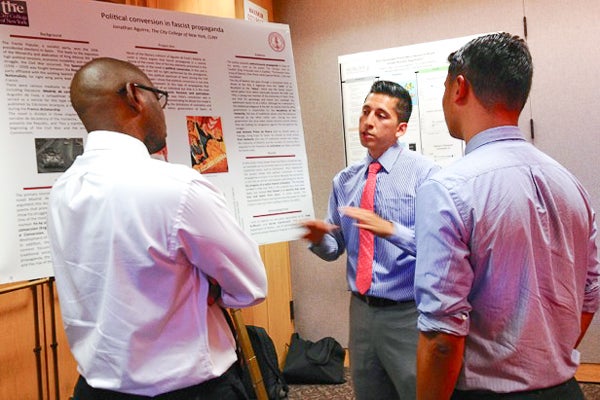|
September 19, 2013
Stanford aims to democratize the humanities professoriate
A collaboration between Stanford and the City College of New York aims to increase minorities and first-generation college students in the ranks of future humanities faculty. By Katie McDonough

Jonathan Aguirre, one of 10 CCNY undergraduates who came to Stanford to work with humanities faculty on independent research this summer, presents his work at the concluding symposium. (Photo: Katie McDonough)
Tamra Lepro, an English major at the City College, City University of New York (CCNY), wants to become a professor of 18th-century English literature.
A new collaboration between CCNY and Stanford gave Lepro, the first in her family to go to college, a rare opportunity to try her hand at doctoral-level humanities research in collaboration with a Stanford professor.
During an eight-week visit to Stanford this summer, Lepro worked closely with faculty mentor Dan Edelstein, a professor of French. Edelstein guided Lepro through a project that explored gender and national identity in a case study of the Scottish biographer James Boswell.
Lepro is one of 10 CCNY students who came to Stanford to work with humanities faculty mentors on independent research this summer.
Their visit is part of a new Stanford-CCNY exchange, launched in 2013 by Senior Associate Dean for the Humanities and Arts Debra Satz, and directed by Associate Professor Lanier Anderson, philosophy.
This summer Stanford hosted CCNY undergraduates for a summer research institute, and this fall three Stanford humanities graduate students are teaching at CCNY.
As the number of prospective minority students for U.S. colleges increases, the Stanford-CCNY exchange takes the next step by encouraging underrepresented and first-generation college students to pursue humanities research at the graduate level.
Participating Stanford graduate students live and teach in the heart of New York City, a major center for humanities research. Students are exposed to a new educational mission in New York, "where institutions and scholars work to democratize higher education more so than in other cities," Anderson said.
Eric Weitz, dean of humanities and arts at City College, noted that the Stanford PhD candidates are now teaching "at what is probably the most ethnically diverse campus in the United States."
Satz, a philosopher whose latest research centers on the ethical limits of markets, developed the program because this type of cross-institutional collaboration "enhances the legitimacy of higher education" by democratizing humanities education.
"It is profoundly important," Satz added, "to have a faculty that is comprised of people with diverse life experiences."
As Satz pointed out, public institutions like CCNY have "historically been the engine of upward mobility, breaking down the monopoly of the elite, private colleges in the 1940s and '50s and bringing new perspectives into scholarship and learning."
Weitz noted that "most CCNY students, including those we sent to Stanford, are first-generation college students. Because of the summer research institute, they are now much better prepared to apply to grad school in the humanities."
In the wake of Stanford's withdrawal from the NYC campus competition, Satz (herself a CCNY alumna) maintained a connection with CCNY administrators and they collaborated to develop this student exchange opportunity.
A 'hothouse' learning experience
CCNY students cite the radical difference of living and doing research on the residential Stanford campus as a key factor in their decision to participate in this program.
Ariana Shirvani, who studied with art and art history Professor Nancy Troy, wanted to have a different kind of college experience, one "where students from multiple disciplines are thrown together to live, study and discuss the concepts they've learned."
The summer research institute, said Shirvani, "represents an opportunity for me to get that hothouse experience I felt I missed out on before."
The students lived on campus at 717 Dolores St. with program coordinator Blake Francis, a doctoral student in philosophy. Offering advice about the pace of humanistic research, he helped students negotiate answers to questions like, "How many hours a day does a graduate student work?"
"The fact that this program allowed them to focus solely on their academic life was a huge advantage for them," he added.
The students formed a community of scholars who were "lively, supportive and fun," Francis said. "The majority of the CCNY students all work full time while attending classes at CCNY. It is staggering just to think of how far each of them has come academically while juggling these other commitments."
The benefits go both ways, Francis said. Graduate students assisting with the program "often talked about how inspired we felt by the CCNY students. They served as a reminder about how exciting and rewarding humanities research is."
Anderson and Francis shared their own research projects with students to demonstrate that the uncertainty one has about research never quite disappears, and actively encouraged the CCNY students to write early and often about their ideas.
Focused on the humanities
The students concluded their studies with a research symposium, where they gave poster presentations to an audience of faculty and invited guests. Students in the Summer Research Early Identification Program (SR-EIP) also presented their research at the same symposium.
SR-EIP, a program that Stanford participates in with 31 other schools through the Leadership Alliance, brings undergraduates from other institutions – many from historically black colleges – to campus to conduct research in primarily medical, natural or social sciences. Since 1992, this organization has seen 200 alumni complete PhDs and MD-PhDs around the country.
The Stanford-CCNY program aims to open up institutions of higher education to talent "regardless of social origin," Satz added. According to her, the program "exemplifies Stanford's commitment to diversifying the pipeline for graduate education."
Katie McDonough is the Humanities and Arts Initiatives coordinator in the School of Humanities and Sciences. For more news about the humanities at Stanford, visit the Human Experience.
-30-
|